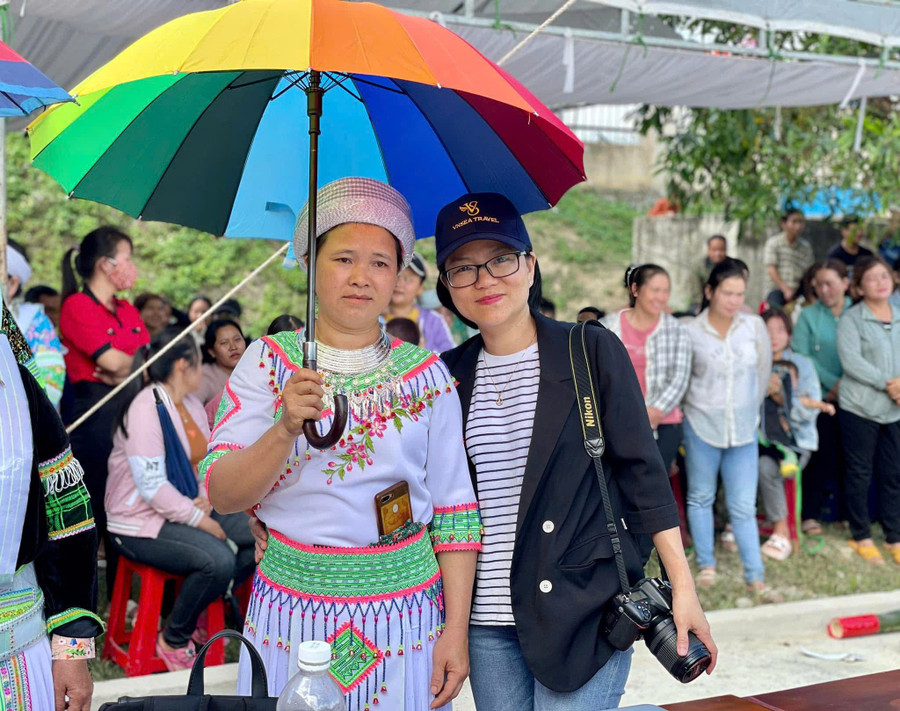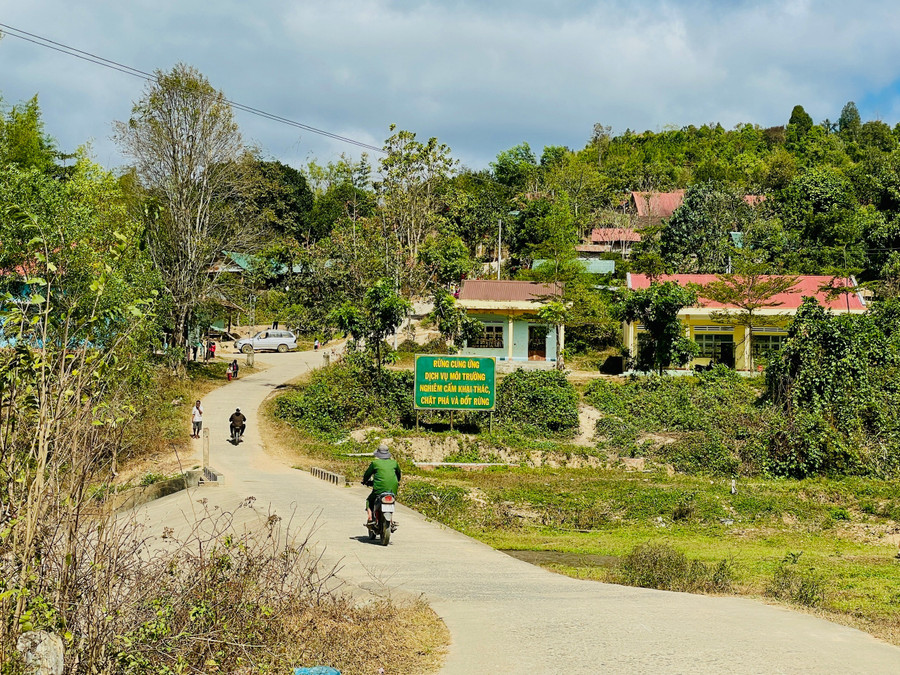As the 100th anniversary of the Vietnamese Revolutionary Press Day (June 21, 1925 - June 21, 2025) approaches, many memories of our profession flood back into our minds. Many people can't believe that female reporters ride motorbikes "alone" to work in remote districts like Kông Chro and Kbang... Sometimes, we travel a total distance of about 240 km, leaving in the morning and returning in the evening. Whether sunny or rainy, day or night, we accept the constant and unique difficulties of our work as an inseparable part of it.
The greatest motivation for us to overcome the challenges is the enthusiastic anticipation and response of readers to our articles. These articles contain countless human stories about life, the struggles of people, efforts to improve their economic situation and preserve culture, the fight against evil and injustice, the celebration of beauty and goodness, and many inspiring messages… messages that would not be widely known without the diligent research, understanding, and expression of journalists.
Conversely, it is the media professionals who are "recharged" by the sincere and unconditional affection of the people in these impoverished areas. I vividly remember one afternoon, with my stomach rumbling with hunger, when I visited a family in Ayun commune (Chu Se district) many years ago. Ayun is the poorest commune in Chu Se district, and the lives of the Bahnar people are extremely difficult. In their simple kitchen, the host did not hesitate to share with us a few handfuls of rice to dip with their only "food": a bowl of chili salt mixed with crushed bitter melon.
It's impossible to forget the sweetness of freshly harvested rice blended with the saltiness of the salt, the slightly bitter taste of the eggplant, and the fiery spiciness of the chili peppers. And that was the simplest yet most delicious meal we ever had as journalists in this remote area.
In early 2024, we attended the Gầu Tào festival of the Mong ethnic group in Ya Hội commune, Dak Pơ district. Although they had left their hometown of Cao Bằng more than 40 years ago, the people still preserved and maintained the beauty of their traditional culture. The allure came from the colorful fringed dresses, the graceful headwear, the unique khene flute dances, and folk games such as throwing the ball and eating men men (a traditional dish)... all of which filled everyone in attendance with excitement.
By around 9 a.m., the sun was blazing like midday, but the activities continued with great enthusiasm. Taking advantage of a spot at a table set up by the commune's People's Committee, I quickly typed out the information to send to the editorial office, despite the scorching sun "baking" me alive. Suddenly, I felt a cool sensation right above my head. Looking up, I saw a Hmong woman holding an umbrella to shield me from the sun. She simply said: "I'm here to watch the festival anyway, so it's killing two birds with one stone." And then, she patiently stood there until I finished sending my message.
It turns out that sometimes, nothing grand is needed; just a small patch of shade like that can fill our hearts with gratitude. I learned her name was Ly Thi Van, and we took a commemorative photo together. I cherish that photo as an unforgettable memento of my profession.

During our time working in this field, we also received a great deal of sincere help from people with "brown skin, bright eyes, and gentle demeanor." I remember, in early 2024, I and two colleagues went on a business trip to Ha Dong commune, Dak Doa district. The commune is more than 60 km from the center of Pleiku city, but it is considered an "oasis" due to its geographical isolation.
To reach Ha Dong, the car had to traverse many treacherous, deserted mountain passes, with many sections completely lacking phone signal or houses and shops. We arrived and worked until midday when the car finally broke down and was stuck in the courtyard of the commune's People's Committee office. Local mechanics were stumped, so we had to call in mechanics from Pleiku City, who brought their bulky tools with them.
It was almost 8 PM, and darkness had enveloped everything, but all efforts proved futile. The car needed some parts replaced. Therefore, the mechanic had to return and come back the next day. Anxiety and the lingering chill of the late season filled everyone with apprehension.
While we were discussing where to stay overnight in Ha Dong, Mr. Um—the commander of the commune's Military Command—approached us and inquired about our situation. Very quickly afterward, he asked us to borrow his Ford Escape to return to Pleiku so we could take care of our household and children.
The Bahnar man said: He bought the car to provide transportation services for villagers in need of emergency care, as the area is quite isolated from the district center, and waiting for an ambulance from the district would be too late.

Mr. Um's decision to lend us his car surprised the whole group, because we had never met before. We hadn't done anything to deserve such attention. Remarkably, when we returned the car, he refused to accept any service fee. It was simply about helping someone in need, that's all. Yet, recently, through an acquaintance in the village, we were shocked to hear that Mr. Um passed away from a stroke at the end of October 2024. The car he often used to take villagers to the hospital for emergency treatment couldn't save his life.
My heart aches. How can I express the depth of my sorrow? And how can I adequately convey my profound gratitude to those who have lovingly and sincerely helped us in our work with selflessness and without ulterior motives, in a life where it seems nothing comes without a price, nothing is given without conditions attached?
The Central Highlands has provided us with ideal working conditions, allowing us to meet wonderful people in a place whose very name evokes a sense of remoteness. This is the spiritual strength that we journalists possess, enabling us to overcome difficulties and bring valuable stories and information to our readers.
Source: https://baogialai.com.vn/lam-bao-vung-kho-post327386.html


![[Photo] Commemorating the unwavering friendship between Vietnam and Laos](/_next/image?url=https%3A%2F%2Fvphoto.vietnam.vn%2Fthumb%2F1200x675%2Fvietnam%2Fresource%2FIMAGE%2F2026%2F01%2F27%2F1769518372051_ndo_br_1-jpg.webp&w=3840&q=75)




![[Photo] Announcement Ceremony of the Art Program “Light Concert – Welcoming the New Year 2026”](/_next/image?url=https%3A%2F%2Fvphoto.vietnam.vn%2Fthumb%2F1200x675%2Fvietnam%2Fresource%2FIMAGE%2F2026%2F01%2F27%2F1769514762857_le-cong-bo-ct-hoa-nhac-anh-sang-1772-9042-jpg.webp&w=3840&q=75)

















































![[Hightling] Conference on the Implementation of Tasks for 2026](/_next/image?url=https%3A%2F%2Fvphoto.vietnam.vn%2Fthumb%2F402x226%2Fvietnam%2Fresource%2FIMAGE%2F2026%2F01%2F27%2F1769477856197_dsc01637.jpeg&w=3840&q=75)



























![OCOP during Tet season: [Part 2] Hoa Thanh incense village glows red.](/_next/image?url=https%3A%2F%2Fvphoto.vietnam.vn%2Fthumb%2F402x226%2Fvietnam%2Fresource%2FIMAGE%2F2026%2F01%2F27%2F1769480573807_505139049_683408031333867_2820052735775418136_n-180643_808-092229.jpeg&w=3840&q=75)
![OCOP during Tet season: [Part 1] Ba Den custard apples in their 'golden season'](/_next/image?url=https%3A%2F%2Fvphoto.vietnam.vn%2Fthumb%2F402x226%2Fvietnam%2Fresource%2FIMAGE%2F2026%2F01%2F26%2F1769417540049_03-174213_554-154843.jpeg&w=3840&q=75)








Comment (0)